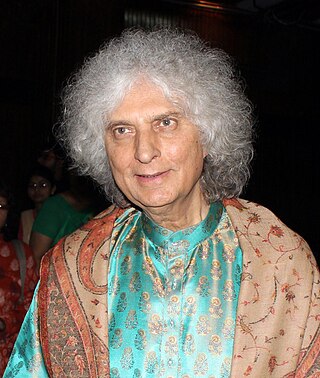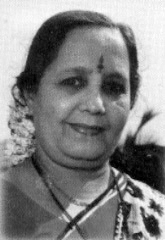
Hemanta Mukhopadhyay, known professionally as Hemanta Mukherjee and Hemant Kumar, was an Indian music director and playback singer who primarily sang in Bengali and Hindi, along with several other Indian languages, including Marathi, Gujarati, Odia, Assamese, Tamil, Punjabi, Bhojpuri, Konkani, Sanskrit and Urdu. He was a prominent artist in Bengali and Hindi film music, Rabindra Sangeet, and various other genres. He was the recipient of two National Awards for Best Male Playback Singer and was popularly known as the "Voice of God".

The music of Bangladesh spans a wide variety of styles. Bangladesh claims some of the most renowned singers, composers and producers in Asia. Music has served the purpose of documenting the lives of the people and was widely patronized by the rulers. It comprises a long tradition of religious and regular song-writing over a period of almost a millennium.
Prayag is a historical name of the area near the confluence of the Ganges and Yamuna rivers in the modern-day city of Prayagraj in northern India.

Jasraj was an Indian classical vocalist, belonging to the Mewati gharana. His musical career spanned 75 years resulting in national and international fame, respect and numerous major awards and accolades. His legacy includes memorable performances of classical and semi-classical vocal music, classical and devotional music, albums and film soundtracks, innovations in various genres including Haveli Sangeeth and popularizing the Mewati Gharana – a school of thought in Hindustani classical music. Pandit Jasraj taught music to amateur and professional students in India, Europe, Canada and the United States.

Pandit Shivkumar Sharma was an Indian classical musician and santoor player who is credited with adapting the santoor for Indian classical music. As a music composer, he collaborated with Indian flautist Hariprasad Chaurasia under the collaborative name Shiv–Hari and composed music for such hit Indian films as Faasle (1985), Chandni (1989), and Lamhe (1991).

Pankaj Kumar Mullick was an Indian music composer, playback singer and actor, who was a pioneer of film music in Bengali cinema and Hindi cinema at the advent of playback singing, as well as an early exponent of Rabindra Sangeet.
Siddhārtha is the birth name of the founder of Buddhism, Gautama Buddha.

Kanika Banerjee was a Bengali Rabindra Sangeet singer.

Anil Krishna Biswas, professionally known as Anil Biswas, was an Indian film music director and playback singer from 1935 to 1965, who apart from being one of pioneers of playback singing, is also credited for the first Indian orchestra of twelve pieces and introducing orchestral music and full-blooded choral effects, into Indian cinema. A master in western symphonic music was known for the Indian classical or folk elements, especially Baul and Bhatiyali in his music. Out of his over 90 films, most memorable were, Roti (1942), Kismet (1943), Anokha Pyar (1948), Tarana (1951), Waaris (1954), Pardesi (1957) and Char Dil Char Rahen (1959).

Suchitra Mitra was an Indian singer, composer, artist exponent of Rabindra Sangeet or the songs of Bengal's poet laureate Rabindranath Tagore, professor, and the first woman Sheriff of Kolkata. As an academic, she remained a professor and the Head of Rabindra Sangeet Department at the Rabindra Bharati University until 1984. Mitra was a playback singer in Bengali films and was associated for many years with the Indian People's Theatre Association.

Suresh Ishwar Wadkar is an Indian playback singer. He performs in both Hindi and Marathi films. He has sung songs in some Bhojpuri films, Odia albums and bhajans and in Konkani films.

The Wadali Brothers – Puranchand Wadali and Pyarelal Wadali – are Sufi singers and musicians from Guru Ki Wadali in the Amritsar District in Punjab, India. Pyarelal Wadali, the younger of the two died on 4 March 2018 at the age of 75 due to cardiac arrest at the Fortis Escorts Heart Institute, Amritsar.

Samta Prasad was an Indian classical musician and tabla player from the Benares gharana. He played tabla in many Hindi films including, Meri Surat Teri Ankhen (1963) and Sholay (1975), and film music composers Rahul Dev Burman and Bappi Lahiri were his disciples.
Pandit Raghunath Seth was a noted Indian exponent of Hindustani classical music through the medium of Bansuri, or bamboo flute; he was also a noted film score composer. He has received Sangeet Natak Akademi Award in 1994, given by Sangeet Natak Akademi, India's National Academy for Music, Dance and Drama.

Manik Varma was an Indian classical singer from the Kirana and Agra gharanas.
Bindhyavasini Devi was an Indian folk musician. She was popularly recognised as Bihar Kokila. She was the founder of Vindhya Kala Mandir, a Patna based music academy promoting folk music, Vindhya Kala Mandir. The academy is associated with Bhatkhande University, Lucknow for 55 years now which is now run by her daughter-in-law Shobha Sinha, son Sudhir Kumar Sinha. She was born in Muzzafarpur in the Indian state of Bihar and specialised in Maithili, Bhojpuri and Magahi folk music. She also sang a popular song, Chhote Dulha Ke, in a movie, Vivah Geet and many of her songs have been released in CD format.

Krishnaji Ganesh Phulambrikar (1898–1974), popularly known as Master Krishnarao, was a musical genius - an Indian vocalist, classical musician and composer of Hindustani music. He was credited with the creation of three Hindustani ragas and several bandishes. Phulambrikar, a recipient of the Sangeet Natak Akademi Fellowship, was also the music composer of several movies, including Dharmatma, a 1935 Hindi film starring Bal Gandharva, a renowned Marathi singer and Padosi, a 1941 directorial venture of V. Shantaram. The Government of India awarded him the third highest civilian honour of the Padma Bhushan, in 1971, for his contributions to music.
Tansen was a figure of Hindustani classical music.












